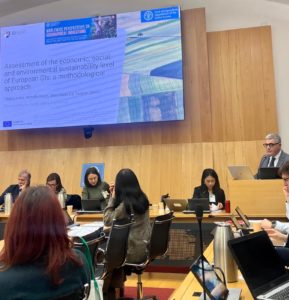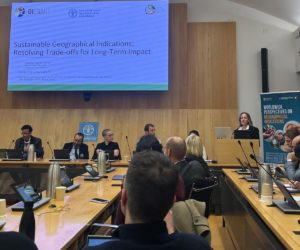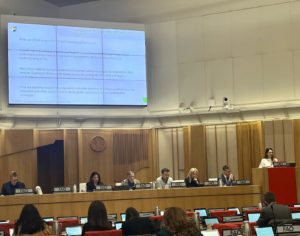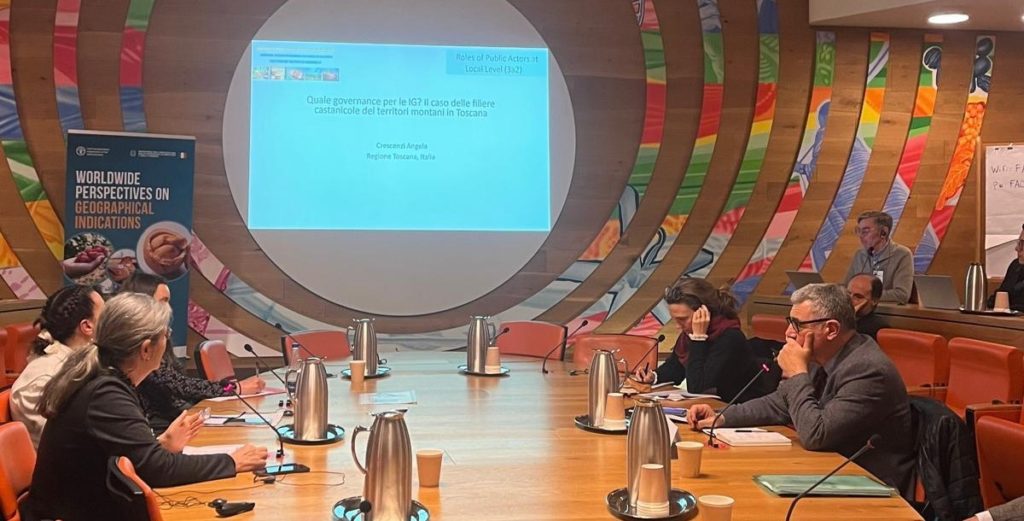
The second “Worldwide Perspectives on Geographical Indications” conference successfully convened at the Food and Agriculture Organization (FAO) headquarters in Rome from February 18 to 21, 2025. Jointly organized by the Italian Ministry of Agriculture, Food Sovereignty and Forestry (MASAF) and FAO, in collaboration with CIRAD, IPI, oriGIn, oriGIn Italia, and the Qualivita Foundation, the event brought together almost 400 participants from all around the world and from diverse sectors, including researchers, policymakers, producers, public actors and development experts.
Building upon the inaugural conference held in Montpellier in July 2022, this edition focused on the theme “Innovations and Traditions for Sustainability.” Discussions centered on how GI systems can foster innovation to enhance sustainability across economic, social, environmental, and governance dimensions, while preserving traditional knowledge and practices.
The conference featured a high-level opening event, followed by two and a half days of technical sessions covering topics such as:
- Innovations to monitor and improve the sustainability performance of GIs;
- Adaptation strategies for GI systems in response to climate change;
- Advancements in governance and the role of producer organizations;
- Policy developments, regulatory frameworks, and protection mechanisms for GIs;
- Technical innovations and the evolution of product specifications.
GI SMART contributions to the conference
GI SMART took center stage during the conference, with several project partners contributing to technical sessions by presenting the research progress and initial findings from the first months of the project.
Sustainability Assessment

During the Sustainability Assessment session, Prof. Filippo Arfini introduced a methodological approach that the GI SMART project is developing to assess the economic, social, and environmental sustainability of European GIs. He is working on this alongside Dr. Armelle Maze, Prof. José Maria Gil, and Mr. Tanguy Chever.
After presenting the project and its objectives, he stressed that the sustainability assessment method has been designed to be replicable over time.
The methodology is based on specific indicators linked to the GI system, including the value chain, the territory, and society, as well as broader policy frameworks such as the Common Agricultural Policy (CAP), the sustainability definition outlined in the new GI regulation, and the Sustainable Development Goals (SDGs). These are composite indicators, made up of multiple sub-indicators, aiming to evaluate spillover effects, externalities (both positive and negative), and ecosystem services while also incorporating the perspectives of citizens and consumers.
GI sustainability performance: addressing trade-offs

In the session dedicated to GIs sustainability performance, Ms Isabella Maglietti-Smith, focused on GIs sustainability challenges due to trade-offs between economic, environmental, social and governance objectives. In GI SMART, she is working on this topic together with Mr François Casabianca and Dr Dominique Barjolle. Throughout her intervention, she explored these trade-offs and outlined examples of “relevant” practices designed to address them effectively for a long-term impact. Relevant practices, rather than simple “good practices”, are context-specific, adaptable and based on the dynamic needs of each GI system. They must emerge from trade-offs between two or more sustainability dimensions to ensure long-term viability.
Consumer Insights on GIs and Sustainability

Dr. Cezara Nicoara contributed to the Marketing and Consumers session with a presentation on “Consumer Insights on GIs and Sustainability: A Systematic Literature Review,” conducted in collaboration with Prof. Matthew Gorton, Dr. Barbara Tocco, Dr. Artyom Golossenko, and Dr. Roberta Discetti. Understanding the success of GIs requires examining the nature of consumer demand, and this literature review serves as a starting point for research within GI SMART. It aims to identify what has already been studied and what gaps remain.
To further explore consumers’ understanding of GIs, GI SMART will use additional research tools such as World Cafés, cross-national surveys, and eye-tracking studies. These methods will help uncover overlooked aspects of consumer perception and identify key factors that enhance the appeal of GIs. The research will also consider the broader objective of promoting sustainable and healthy diets.
The Role of Public Actors

To conclude, the conference also dedicated space to the role of public actors at local level, with several AREPO member regions (Bavaria, Epirus, and Tuscany) sharing their experiences. Presentations showcased how public actors play a crucial role in supporting producers both before registration and throughout the management of a GI product. Regions often assist producers in certifying new products, continuously monitoring value chains, and providing expertise and tools to help address various challenges. Their involvement also extends to governance-related issues, mediating conflicts, and encouraging producers to remain engaged in the GI system.
You can watch the conference recordings and revisit the sessions at the following link: https://www.fao.org/webcast/home/en/item/6958/icode/










